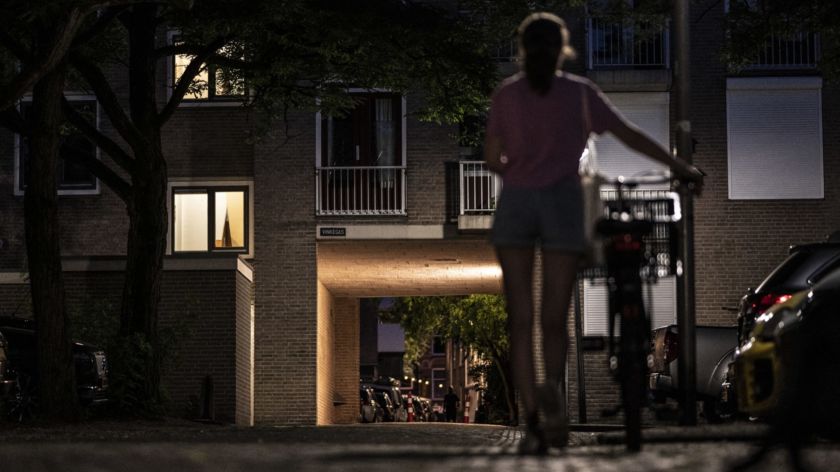‘As a woman, cycling home from the Vierdaagsefeesten feels unsafe almost every night’
-
 Verslaggeefster Marieke Smid op weg naar huis. Foto: Paul Rapp.
Verslaggeefster Marieke Smid op weg naar huis. Foto: Paul Rapp.
Catcalls, yelling or whistling. For women, it can be very uncomfortable having to cycle home alone after the Vierdaagsefeesten. Vox employee Marieke Smid (21) experienced this, and multiple women have had similar experiences, though not all these issues are known to the Vierdaagsefeesten organisation or the police. Marieke has written down her story below.
As a reporter at the Vierdaagsefeesten, I have often walked or cycled through the city by myself for the last couple of evenings. Many placed are still crowded and good fun after 12AM, but not everywhere. There are several quieter streets where I’ve been shouted at in the evening every single time so far.
Things began early on Saturday. I’m still making the journey to the Festival op ’t Eiland, when a group of men – 20 years old at most, wearing black and carrying cans of beer – start yelling at me as I cross the Waalbrug. This is an incredibly uncomfortable experience when you’re by yourself, because you don’t know what they’re going to do next. Are they going to chase me? And what should I do: ignore them or make a comment? I decide to turn my music up a little and cycle a little faster.
‘Ugly Bitch’
When I make my way back across the Waalbrug, I’m riding on the back of someone else’s bike. And again, there’s another group of boys yelling on the bridge. ‘Hey whore! You’d better get off that bike, you’re too fat!’
Monday evening: same old song. In the Van Schevichavenstraat a man whines ‘Ugly bitch! Go home!’ The shouters are always men – sometimes they’re younger than I am, sometimes they’re just a tad too drunk. But why are they doing this? Do they think I enjoy it? Do they think it makes them look tough?
I certainly don’t. It’s led me to more carefully consider my route homeward and asking my friends to turn their phone volume up, so that they’re sure to hear it if I call.
Frustration
And it seems I’m not the only one with uncomfortable yelling experiences; calling around leads to a host of similar stories. A 21-year-old woman told me that an older man started yelling at her and her friend in the city. ‘Shake those asses, ladies.’ They tried to ignore him, but he kept going. ‘Hey, I’m talking to you. Shake ‘em for me! He even tailed us for a bit. It was very intimidating.’
These stories are a source of frustration, as well as questions. How is it that this is still an everyday occurrence at parties in 2022? Can’t the city and the Vierdaagse organisation do anything about it? And most of all: How will we be able to get home safe?
Beaten Up
The fact that women are often harassed at the Vierdaagsefeesten is something that Walter Leensen’s daughter unfortunately had to experience herself, according to an article from De Gelderlander. After a night out at the Hunnerpark, a group of men yelled at her, calling her a ‘dirty whore’. When Leensen’s son-in-law tried to talk to the men, both he and the daughter were beaten up. Leensen’s daughter was hit especially hard: her father had to take her to the hospital after she suffered bruises and sore spots all over her head. The family will be pressing charges next week.
But despite the nasty experiences of Smid and various other women, the police have stated that they have yet to receive any reports of street harassment during the Vierdaagse. Similarly, a spokesperson for the Vierdaagse organisation was very surprised when told of the situation.
‘We haven’t received any signals regarding this’, she says. ‘In fact, various café owners have told us that there is a fun atmosphere, with fewer issues than ordinary nights out. But this is unacceptable. If visitors experience this sort of behaviour on party grounds, they can talk to security personnel or bar staff. Outside the terrain, people can report to the police.
Taboo
Yana van de Sande, of the Nijmegen collective Catcalls of Nimma, is not surprised by the situation. She and other women are using the Instagram account to counter street harassment. They recently even held a march of protest through the city. ‘There is a certain culture at these kinds of parties’, she states. ‘Comments and shouts are thought to be a funny joke, or a compliment.’
She is not surprised to find that the organisation did not receive any reports. ‘Talking about these issues at parties is taboo. You’re there to have fun, so you try to shake it off or supress it. But this is not normal, according to her. ‘The fact that we seem to blindly accept this simply has to change.’
This article by Marieke Smid was published in De Gelderlander earlier.



